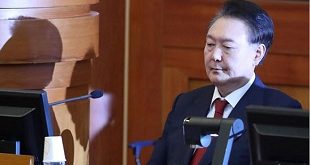
Tunis, Tunisia | AFP |
German Chancellor Angela Merkel announced a new agreement with Tunisia on tackling illegal migration during a visit Friday, following tensions over the case of the Tunisian suspect in the Berlin market attack.
Merkel, on a two-day trip to North Africa that also included a stop in Egypt, said Germany and Tunisia had agreed on faster repatriations for rejected asylum seekers and job training for Tunisians.
The German leader, who faces elections in September, is under pressure to reduce the number of asylum seekers coming to her country, which has taken in more than one million migrants since 2015.
Merkel, who also addressed Tunisia’s parliament, has urged North African states to step up border controls and expedite procedures to repatriate migrants whose asylum applications are rejected.
Germany has said Tunisian bureaucratic delays meant it could not expel Anis Amri, the suspect in the truck rampage at a Berlin Christmas market that killed 12 people, even though his asylum application had been rejected six months earlier.
Merkel said the two countries had agreed that questions from Germany on the identities of Tunisian asylum seekers will be answered within 30 days.
“We will also help Tunisia to set up a registration system. Replacement passports are then meant to be issued within one week,” she said at a joint news conference with President Beji Caid Essebsi.
This agreement “will satisfy Tunisia and will satisfy Germany”, Essebsi said, adding that it concerned about 1,500 Tunisians whose residency requests have been turned down by Germany.
“Measures will be taken in the Tunisian consulates in Germany to help in their identification,” he added.
Merkel’s talks also covered ways to respond to years of instability exploited by people smugglers in neighbouring Libya, where winter departures on perilous boat crossings to Europe have spiked.
“We know the political situation in Libya is difficult,” she said, welcoming Tunisia’s efforts to help resolve the turmoil.
“No-one is more interested in political stability in Libya than its neighbours, but I’ll say, because of the migration issue, it’s also important for us Europeans.”
– Aid funding pledge –
The migrants issue had already been contentious in Germany where sexual assaults by large groups of mostly North African men on New Year’s Eve 2015-16 against women in Cologne provoked outrage.
Merkel’s interior minister floated an idea for North African countries to build holding centres for returned migrants, but it was rejected by Merkel’s centre-left coalition partners and rights groups.
The visit was also a chance for Merkel to pledge support for a country often hailed as a rare success story of the Arab Spring uprisings that shook the region and toppled autocrats including longtime Tunisian dictator Zine El Abidine Ben Ali.
Since its 2011 revolution, Tunisia has passed a new constitution and held free parliamentary and presidential elections.
But the nation faces high unemployment, social tensions and the threat from jihadists who have killed dozens of soldiers and police as well as civilians including 59 foreign tourists.
Speaking in Tunis, Merkel announced 250 million euros ($264 million) in development aid.
“The funds are for rural development, small and medium enterprises, but mainly for youths… who especially need job training and employment opportunities,” she said.
– ‘Beacon of hope’ –
She later told parliament that Tunisia is a “beacon of hope” for Europe, praising both the pro-democracy protests and the country’s subsequent managing of the “rocky path” to democracy.
“The fact that you as a freely elected democratic parliament exist is a legacy of the great courage of the citizens of your country,” Merkel said.
“Tunisia is going its way, and your country, as a young democracy, can bank on our full support and cooperation, politically, economically and socially.”
Merkel, who left for home later Friday, had also planned a trip to Algeria last week but it was called off after President Abdelaziz Bouteflika fell ill.
Her North Africa visits were part of a larger diplomatic push which took her last year to Mali, Niger and Ethiopia.
Germany, which this year holds the G20 presidency, has also announced investment partnerships in Africa with the long-term goals of reducing poverty and deterring people from leaving.
Merkel was joined on her trip by a business delegation that could bring much-needed investments.
 The Independent Uganda: You get the Truth we Pay the Price
The Independent Uganda: You get the Truth we Pay the Price



